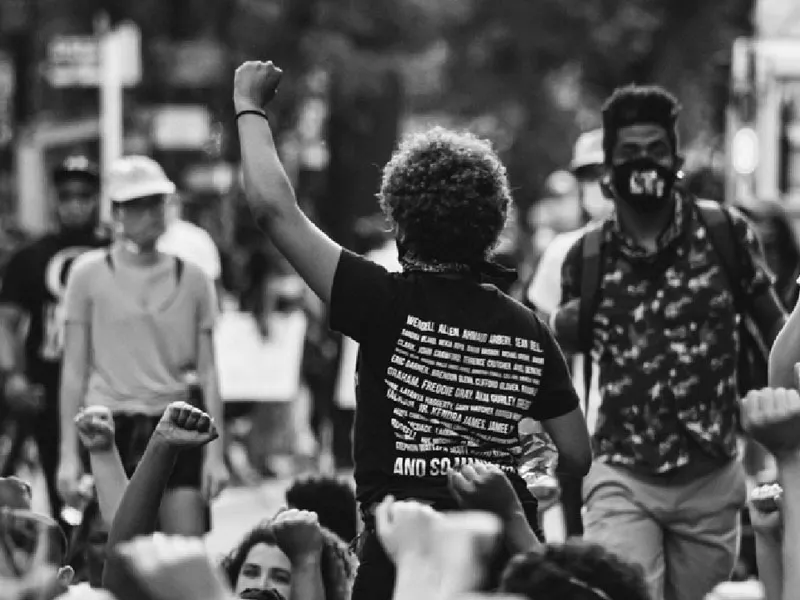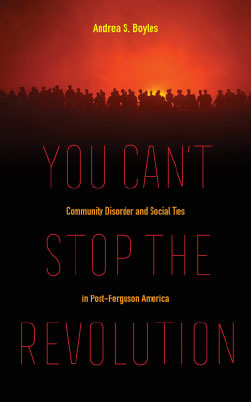
It has been almost seven years since Michael “Mike” Brown, Jr. was killed, sparking civil unrest in Ferguson, Mo. I remember it like yesterday—the hours, days, weeks, and months of relentless “direct action” occurring across the region, nation, and globe. This widespread amalgamation of activism had been a somewhat unexpected and yet organic and eventual mobilizing of Black citizens in pursuit of social justice. To date, the Ferguson uprising is the longest sustained Black resistance (more than 400 days) since the Montgomery bus boycott (381 days), and I was a participant observer in it. From police protests to town hall meetings, city council meetings, anti-gun violence summits and more, this Black-led effort was all-encompassing, transformative, and committed to protecting and advancing Black lives and the quality thereof.
Black citizens locked in and committed themselves to uncovering and tackling perceived injustices and widespread systemic discrimination generally. I understood this almost immediately—within the first few hours of arriving at the outer crime scene (e.g., “Ground Zero”), as members of the Brown family and Black community gathered and grieved, and before the world chimed in. As a Black native St. Louisan, sociologist, and critical criminologist with expertise in social justice and Black citizen-police conflict specifically, I was determined to see the process through; I purposed to be present for the journey. That is, I was fully available and engaged at the behest of “the people” and intimately accounted for the movement and overall Black experience through the heat of it. This first meant committedly staying open and amenable to doing the work of relationship- and community-building, as Black citizens determined it.
My insider status as a Black woman St. Louisan—where Ferguson is a suburban municipality—did not automatically grant me the right or suitability for accessing the movement or people. In other words, the idea or assumption that my shared and intersecting social location and lived oppression through Blackness, femaleness, and previous impoverishment alone constituted acceptance wreaks of privilege, an approach often lost on elites and the white racial majority, especially. Respect and trust must be earned, irrespectively, in the Black community. The fact that I also faced similar everyday discrimination did not negate the weight of my then academic and administrative appointments, research and publishing agenda, or improved social mobility.

Reflexivity and self-examination are important. And in the absence of these behaviors, we see and experience the interactive effects of race and place. To understand this more deeply, we can trace how Black people have long suffered an auspicious agenda that, in practice, only advanced segregation and containment to protect the interests of privileged populations across locations. While motived by perceived political and economic benefits, these actions normalized race and class threat, detachment, and exploitation for Black and other minoritized populations. Aggressive and excessive policing and criminalizing for profit—as a Department of Justice report outlined in Ferguson—are some of many testaments, all of which subsequently fueled this Black twenty-first century uprising.
Dominant and institutional exchanges with minoritized communities continue to shore up age-old systemic plays for power. The business of (de)valuing, possessing, and then governing places has remained true across geographic and intellectual spaces—hence, the reason the presence, voices, or agenda of Black frontline community workers, activists, or citizens generally have been afterthoughts or practically absent comparably. I account for these exploitive relationships in my recent books, You Can’t Stop the Revolution: Community Disorder and Social Ties in Post-Ferguson America and Race, Place, and Suburban Policing: Too Close for Comfort. Throughout my research, I found many of these oppressive relationships framed as community-centered by the privileged or power majority, but experienced and perceived differently by members of the Black community.
For example, while hanging out and talking with folks about various topics following an inner-city ward meeting, I asked activists/organizers “Hakim,” “Kavion,” and “Chon” what they thought about academics. In general, they described us as “analyzing for the sake of over-analyzin’” and therefore, not much help to the community. This is consistent with another community leader who described our work as “analysis paralysis,” and sees researchers as theory- and discussion-driven and incapable or unwilling to translate their knowledge into “hands on,” substantive engagement.
It is with a great, liberating imagination that I hope my research will “pay it forward,” illuminating historical truths and empowerment.
Reflexivity and intentional sweat equity, time, and/or money spent at the directing of “the people” advances trust, social justice, and Black lives across all spheres. My work finds those attributes as key in building and sustaining relationships and services across communities. Contrarily, economic ambition and profiteering have proven antithetical to engaging with and advancing the Black community. The persisting construction and relegation of Black people and communities of color widely—poor ones particularly—centered on white racial-spatial politics furthers race and class segregation, social control, and pervasive discrimination wholly; all of which coalesced over time, igniting the Ferguson uprising and the Black Lives Matter movement.
Contemporary Black resistance is a continuum and collective effort; it is also evolutionary, transformative, holistic, and constant. These principles give rise and guide my work, theoretically and practically. I stand on the shoulders of many, and thus, embrace my relationship and accounting of “community” as my duty; that is, a humanitarian responsibility. It is with a great, liberating imagination that I hope my research will “pay it forward,” illuminating historical truths and empowerment.
Building Community Through the Arts
Now in its eleventh year, Building Community Through the Arts is co-taught by Barbara Hayley, a professor in and chair of the Department of Theatre and Dance, and Ron Bechet, a professor of art at Xavier University in New Orleans. This course examines theory and practice of community-based arts, engagement, and social justice. While community partnerships shift annually, in 2021 Tulane and Xavier students worked in teams with the grassroots organization Orleans Legacy Project in collaboration with the Equal Justice Initiative based in Montgomery, Ala., collecting historical research and assisting in creative marketing, fundraising, and programming. In class, students discuss and reflect on readings, guest visits, videos, and case studies via writings, presentations, and story circles, a process created by John O’Neal and Free Southern Theatre, a theatre arm of the '60s civil rights movement.
Boyles’ recent book You Can’t Stop the Revolution: Community Disorder and Social Ties in Post-Ferguson America was published by University of California Press in 2019. In November 2020, she was appointed as a Sociologists for Women in Society (SWS) delegate to the United Nations’ Economic and Social Council to provide expertise on issues such as reproductive health and violence against women, and in 2021, Boyles joined the faculty of the School of Liberal Arts as associate professor in the Department of Sociology and Africana Studies Program.

